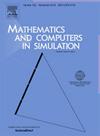An adaptive positive preserving numerical scheme based on splitting method for the solution of the CIR model
IF 4.4
2区 数学
Q1 COMPUTER SCIENCE, INTERDISCIPLINARY APPLICATIONS
引用次数: 0
Abstract
This paper aims to investigate an adaptive numerical method based on a splitting scheme for the Cox–Ingersoll–Ross (CIR) model. The main challenge associated with numerically simulating the CIR process lies in the fact that most existing numerical methods fail to uphold the positive nature of the solution. Within this article, we present an innovative adaptive splitting scheme. Due to the existence of a square root in the CIR model, the step size is adaptively selected to ensure that, at each step, the value under the square-root does not fall under a given positive level and it is bounded. Moreover, an alternate numerical method is employed if the chosen step size becomes excessively small or the solution derived from the splitting scheme turns negative. This alternative approach, characterized by convergence and positivity preservation, is called the “backstop method”.
Furthermore, we prove the proposed adaptive splitting method ensures the positivity of solutions in the sense that it would be possible to find an interval such that for all stepsizes belong, the probability of using the backstop method can be small. Therefore, the proposed adaptive splitting scheme avoids using the backstop method with arbitrarily high probability. We prove the convergence of the scheme and analyze the convergence rate. Finally, we demonstrate the applicability of the scheme through some numerical simulations, thereby corroborating our theoretical findings.
基于分裂法的自适应正保留数值方案,用于求解 CIR 模型
本文旨在研究一种基于拆分方案的考克斯-英格索尔-罗斯(CIR)模型自适应数值方法。对 CIR 过程进行数值模拟所面临的主要挑战在于,大多数现有数值方法都无法保证解的正向性质。在本文中,我们提出了一种创新的自适应分割方案。由于 CIR 模型中存在平方根,因此需要自适应地选择步长,以确保在每一步中,平方根下的值不会低于给定的正值水平,并且是有界的。此外,如果选择的步长过小,或从分割方案中得出的解变成负值,则采用另一种数值方法。此外,我们还证明了所提出的自适应拆分方法能确保解的正向性,即有可能找到一个区间,在所有步长都属于该区间的情况下,使用逆止方法的概率可以很小。因此,所提出的自适应分割方案可以避免以任意高的概率使用逆止方法。我们证明了该方案的收敛性,并分析了收敛速率。最后,我们通过一些数值模拟证明了该方案的适用性,从而证实了我们的理论发现。
本文章由计算机程序翻译,如有差异,请以英文原文为准。
求助全文
约1分钟内获得全文
求助全文
来源期刊

Mathematics and Computers in Simulation
数学-计算机:跨学科应用
CiteScore
8.90
自引率
4.30%
发文量
335
审稿时长
54 days
期刊介绍:
The aim of the journal is to provide an international forum for the dissemination of up-to-date information in the fields of the mathematics and computers, in particular (but not exclusively) as they apply to the dynamics of systems, their simulation and scientific computation in general. Published material ranges from short, concise research papers to more general tutorial articles.
Mathematics and Computers in Simulation, published monthly, is the official organ of IMACS, the International Association for Mathematics and Computers in Simulation (Formerly AICA). This Association, founded in 1955 and legally incorporated in 1956 is a member of FIACC (the Five International Associations Coordinating Committee), together with IFIP, IFAV, IFORS and IMEKO.
Topics covered by the journal include mathematical tools in:
•The foundations of systems modelling
•Numerical analysis and the development of algorithms for simulation
They also include considerations about computer hardware for simulation and about special software and compilers.
The journal also publishes articles concerned with specific applications of modelling and simulation in science and engineering, with relevant applied mathematics, the general philosophy of systems simulation, and their impact on disciplinary and interdisciplinary research.
The journal includes a Book Review section -- and a "News on IMACS" section that contains a Calendar of future Conferences/Events and other information about the Association.
 求助内容:
求助内容: 应助结果提醒方式:
应助结果提醒方式:


